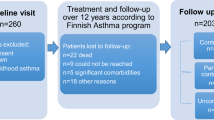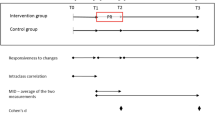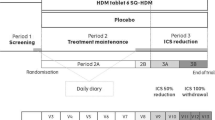Summary
Health-related quality of life is increasingly used as an outcome measure in asthma. The aim of this study was to define the relationship between asthma symptoms, lung function and health related quality of life in a community based sample of people with asthma ranging from no recent asthma to severe persistent asthma. We recruited subjects at the age of 42 years from a well-described community cohort, the Melbourne Epidemiological Study of Childhood Asthma, to define this association. 161 subjects completed a respiratory symptom survey, the Asthma Quality of Life Questionnaire and had lung function testing. According to the previous surveys and when applicable in agreement with GINA, subjects were classified into 4 groups: no recent asthma, sporadic asthma, intermittent asthma and persistent asthma, with the persistent asthma group further categorised by wheezing frequency and lung function. 55 had no recent asthma, 31 had sporadic asthma, 39 had intermittent asthma and 36 had persistent asthma. There was clear evidence of lower total scores with increased asthma severity, with median scores of 6.8 for the sporadic asthma group, 6.4 for the intermittent and 5.5 for the persistent asthma group compared to 6.9 in those with no recent asthma. All domain scores within the intermittent and persistent asthma groups were lower than scores for the no recent asthma group (p < 0.01). Those with persistent asthma and low FEV1% had the lowest quality of life scores (4.6). Analysis of this population cohort highlights that health related quality of life in patients with asthma strongly depends on symptom frequency and lung function and underlines the necessity of adequate treatment.
Zusammenfassung
Das Erfassen von Lebensqualität wird ein zunehmend wichtiger „Outcome Parameter“ bei chronischen Erkrankungen. Ziel dieser Studie war es, die Beziehung von Asthmasymptomen, Lungenfunktion und der damit verbundenen Lebensqualität bei einer Patientengruppe im Alter von 42 Jahren mit einem breiten Asthmaschweregrad -Spektrum zu erfassen. Die Cohorte stammt aus einer der ältesten Asthma-Langzeitstudien, der „Melbourne Epidemiological Study of Childhood Asthma“, und wird seit dem Alter von sieben Jahren alle 7 Jahre nachuntersucht. 161 Patienten füllten einen respiratorischen Fragebogen und den „Asthma Quality of Life Questionnaire“ von E. Juniper aus und erhielten eine Lungenfunktionsuntersuchung. Die Klassifizierung des Asthmaschweregrades erfolgte nach Symptomen und Lungenfunktion (GINA Kriterien) und ergab folgende Verteilung: kein rezentes Asthma mehr (n = 55), sporadisches Asthma (n = 31), intermittierendes Asthma (n = 39) oder persistierendes Asthma (n = 36). ERGEBNISSE: Mit zunehmendem Asthmaschweregrad nahm die Lebensqualität deutlich ab. Der Gesamtscore betrug 6,9 für Patienten mit keinem rezentem Asthma, 6,8 für Patienten mit sporadischen Asthma, 6,4 für Patienten mit intermittierendem Asthma und 5,5 für Patienten mit persistierendem Asthma. Die niedrigsten Scores (4,6) wurden bei Patienten mit persistierendem Asthma und verminderter Lungenfunktion (FEV1, <80 % predicted) erhoben (p < 0,01). Die Ergebnisse dieser Studie zeigen, dass die Lebensqualität von Asthmapatienten stark von Symptomen und Lungenfunktion abhängt, und unterstreichen die Wichtigkeit einer adäquaten Asthmatherapie.
Similar content being viewed by others
Author information
Authors and Affiliations
Corresponding author
Rights and permissions
About this article
Cite this article
Horak, E., Sawyer, S.M., Roberts, M. et al. Impact of disease severity on quality of life in adults with asthma. Wien Klin Wochenschr 117, 462–467 (2005). https://doi.org/10.1007/s00508-005-0392-1
Received:
Accepted:
Published:
Issue Date:
DOI: https://doi.org/10.1007/s00508-005-0392-1




